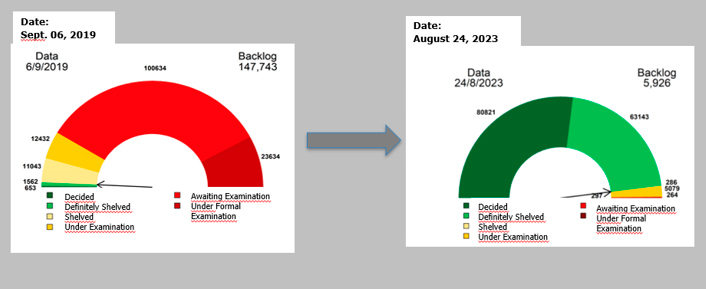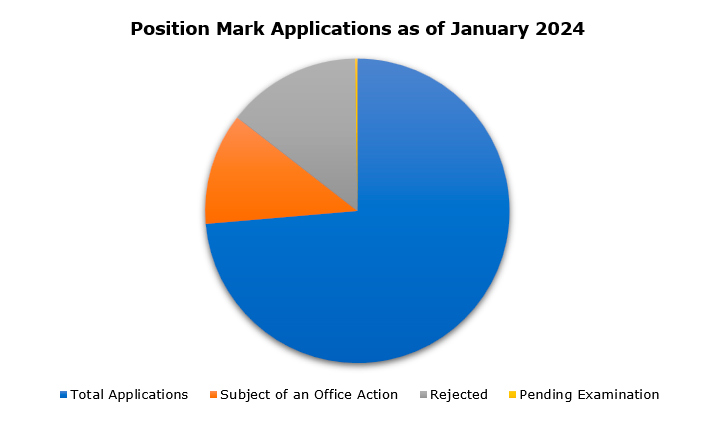If 2022 was the year when several Patent Term Adjustment...
1. IP Litigation highlights
Ana Paula Affonso Brito e Maria Eduarda Junqueira
I. Patent Term Adjustment cases: the scenario after 2.5 years of the Supreme Court’s decision
If 2022 was the year when several Patent Term Adjustment (PTA) actions were filed in response to the Supreme Court’s ADI 5529 decision of May 2021, which abolished the minimum term of 10 years and 7 years for patents of invention and utility models, respectively, 2023 was the year to face the main developments and outcomes regarding the merits of such cases.
Although the so-called Patent Term Adjustments or Supplementary Protection Certificates (SPCs) are not regulated in Brazil, nor are subject to any legal formal provision, patentees claiming to be harmed by such new scenario have been filing lawsuits, in Brazil, requesting patent term adjustments based on the BRPTO’s unjustified delay in analyzing patent application(s), on a case-by-case basis.
There are currently over 40 lawsuits requesting a PTA before the Brasília Federal Courts, and most of them are supported by the same arguments: an excerpt from Hon. Justice Dias Toffoli’s (of the Brazilian Supreme Court) decision, quoting the PTA expression as an institute of other countries, which, in theory, would allow the extension of the patent validity term in Brazil as well.
Most of the already issued decisions concern preliminary injunctions requests that do not have the purpose of effectively extending the patent term definitively, but only suspending the patent expiry date provisionally, until a decision is made on the merits of the matter. Great part of such preliminary injunction requests have been denied in both instances, but few of them have been granted, though, keeping the patent valid until a decision on the merits is rendered.
While several lawsuits are still pending judgment, others have already had their merits analyzed by the Trial Court. Recently, some of the actions were dismissed by the trial Court and now the discussions are taking place on the Panel of Judges of the Federal District Court of Appeals.
In one of the referred lawsuits, the Justice has highlighted that:
“it would not [be] possible to infer from the STF ruling, nor from the individual votes of the justices who participated in the judgment, that there was room for modulation of the patent term based on the public administration's delay in analyzing patent applications. On the contrary, the decision was based on the principle of legal certainty, the temporality of the patent, seeking to bring predictability to patent terms and altering the validity term of a patent based on the delay in its analysis offends this principle, insofar as it changes the term provided for in the law based on grounds no longer provided for in the law since the judgment of ADI 5529.”[1]
Nevertheless, it should be noted that the First Panel of the Supreme Court has already had the opportunity to analyze two constitutional complaints (nº 56.378 and nº 53.181) related to the PTA lawsuits filed in Brasilia and decided that the request for adjustment of the patent term conflicts with what was decided in lawsuit ADI5529. Thus, it is quite possible that the injunctions currently in effect will be reverted by the Brasilia Court since the Supreme Court has already ruled on the matter in some decisions contrary to the adjustment of the patent term.
II. The growth in the number of lawsuits involving IP matters and the Judiciary’s goals for 2024
According to the National Council of Justice, in 2022 31 million new lawsuits were filed in Brazil, in the various fields of law - a remarkable number in the history of the Brazilian Judiciary, totaling 81.4 million lawsuits pending a final decision on the merits[2].
Although the public survey with the 2023 results on the Judiciary has not yet been made available, this year’s experience shows that IP litigation cases certainly continue to be a trend, increasing steadily since the pandemic.
In the Federal Courts, the year 2023 brought the incorporation of the 12th Chamber of the Rio de Janeiro Federal Court as an additional one specialized in IP matters, alongside the other four existing specialized courts in this matter.
Since such incorporation in the 2nd half of 2023, a third of the caseload from certain established specialized courts was redistributed to the newly formed 12th Chamber to expedite case resolutions – reducing the number of cases that were already handled by the Judges from other Chambers and, consequently, helping to decrease the Court’s backlog on IP related disputes.
The President of the Brazilian Federal Court of Appeals for the 2nd Circuit emphasized the primary goals of this strategic initiative: (i) to advance the Court's specialization project, aligning it with its areas of expertise; (ii) to strive for a fair distribution of caseloads among federal judges, promoting a balance in procedural demands; (iii) to enhance the efficiency of judicial services, raising the quality and predictability of rulings; and (iv) to guarantee the attainment of the court's objectives, with a critical focus on upholding the constitutional principle of procedural speed [3].
The above statement seems to be well aligned with the National Council of Justice goals set for 2024. Among the 11 targets set by the president of the National Council of Justice and the Federal Supreme Court, Minister Luís Roberto Barroso, the following are particularly noteworthy when it comes to IP disputes, as, in theory, increase the Judiciary’s efficiency and reduce the Court backlogs:
- National Goal 1 – to judge more cases than are filed per year;
- National Goal 2 – to judge older cases in order to reduce backlog;
- National Goal 3 – to encourage conciliation between the parties, avoiding lawsuits within the ability to negotiate.
2. Brazilian Patent Landscape highlights
Gabriela Neves Salerno
I. Action Plan of the National Intellectual Property Strategy (ENPI)
In October 2023, the Interministerial Group on Intellectual Property (GIPI) published the 2023-2025 Action Plan for the National Intellectual Property Strategy (ENPI), aiming to promote an intellectual property system that ensures greater competitiveness and social and economic development in Brazil. The plan encompasses 63 actions and 161 deliveries across seven strategic areas. Measures to promote administrative efficiency, leading to a new target decision time for patent applications – a reduction from 6.9 years (as of December 2022) to 3 years by July 2025 – are among the objectives. A reduction from 3.7 months to 3.5 months is the goal for industrial design applications.
Other challenging goals of the plan include increasing Brazil’s position from 6th to 3rd position in the global ranking of countries in terms of trademark registrations and from the 12th to the 11th position in industrial design filings.
The initiatives outlined in the Action Plan include green technology matchmaking to leverage intellectual property for sustainable development. Other actions involve increasing diversity in the intellectual property system through e.g. training programs for women entrepreneurs. There are also plans for action in the educational sphere, with the aim of disseminating intellectual property culture in schools and universities.
Additionally, an intellectual property intelligence hub will also be established to identify technological trends across various areas of knowledge. Another relevant front that is being intensified in ENPI's plan is the criteria related to IP in calls for proposals to promote research projects using public resources that result in innovations.
II. BPTO's Strategic Plan for 2023-2026
2023 saw an increase in patent applications compared to the previous year, with a total of 27,918 patent applications filed - a 2.9% increase compared to 2022. The top five countries contributing to nearly 70% of total patent filings were the United States (30%), Brazil (20%), China (7%), Germany (6%), and Switzerland (5%).
Among other objectives, the BPTO aims to further increase patent filings and reduce prosecution time in the coming years. To achieve these goals, the Office launched a strategic plan for 2023-2026, focusing on nine pillars: (1) quality and agility in patent granting; (2) promotion of IP culture; (3) consolidation of Brazil's role in the international IP landscape; (4) recognition of BPTO's value to society; (5) digital transformation for improved user service; (6) modernization and expansion of service capacity; (7) retention of the workforce to maintain a high-performance service; (8) efficient and sustainable logistical and economic infrastructure support; and (9) improvement of governance, management practices, and institutional relationships.
Regarding patents and industrial designs, the plan proposes actions to automate processing flows by replacing current tools and implementing new ones, as well as simplifying workflows. Patent searches are set to be optimized by outsourcing to other sectors, such as universities. The use of artificial intelligence tools is equally pointed out as a resource to assist patent searches.
Additionally, the Strategic Plan presents actions to optimize the patent database by scanning the document collection and correcting possible errors and inconsistencies, in addition to updating information in accordance with the standards of the World Intellectual Property Organization (WIPO). Still in this regard, a new information search solution is proposed.
In line with quality improvement, the Strategic Plan proposes the development of an automated system for reviewing the quality and compliance of the examination of patent applications and industrial design registrations, as well as a research project aimed at gathering the impression of the quality of the examination for external users. The improvement of second-instance procedures (appeal phase) is also included in the Strategic Plan, in order to improve the quality of appeals and administrative nullity requests, in addition to guaranteeing their predictability and legal security.
III. Positive Results of the Patent Backlog Combat Plan
The Patent Backlog Combat Plan, launched in 2019 by the BPTO to settle approximately 150,000 patent applications pending examination, was certainly one of the most successful projects in the Office over the last five years. The BPTO achieved a remarkable 96% examination rate by August 2023, as depicted in the charts below:

The red area in both charts represents patent applications pending technical examination, while the green area represents decided or shelved applications. The evolution brought about by the Patent Backlog Combat Plan is evident, enhancing the credibility of the BPTO, once known as one of the slowest patent-granting offices worldwide.
IV. Fast-Track Examination
Another successful BPTO’s project involves the implementation of various fast-track examination categories in recent years. Currently, the BPTO offers 17 types of fast-track examination for patent applications, according to the following division:
(a) In view of the cooperation
- PPH (Patent Prosecution Highway) agreements with the following Patent Offices: PROSUL, JPO, USPTO, EPO, DKPTO, BPTO-FR, UKIPO, CNIPA, APO, OEPM, PRV, KIPO, BPTO-PT, CIPO, PRH, and IPOS;
- Patent applications from patent families originally filed in Brazil.
(b) In view of the technology
- Patent applications seeking protection for green technologies;
- Patent applications covering technology for the diagnosis, prophylaxis, and/or treatment of AIDS, cancer, or rare or neglected diseases (Chagas disease, Dengue, Dengue Hemorrhagic Fever, Chikungunya, Zika, Schistosomiasis, Hansen's disease, Leprosy, Leishmaniasis, Malaria, Tuberculosis, Buruli ulcer, Neurocysticercosis, Echinococcosis, Yaws, Fascioliasis, Paragonimiasis, Filariasis, Rabies, Helminthiasis, and manifestations resulting from intoxication or poisoning by venomous or poisonous animals);
- Patent applications covering technology for COVID treatment.
(c) In view of the applicant
- Patent applications from individuals aged 60 or older;
- Patent applications from individuals with physical or mental disabilities;
- Patent applications from individuals with severe illnesses;
- Patent applications from micro-enterprises and/or small enterprises;
- Patent applications from Scientific, Technological, and Innovation Institutes;
- Patent applications from Startups.
(d) In view of the situation
- Patent applications whose granting is a condition to obtain financial resources;
- Patent applications whose object is reproduced by third parties without authorization;
- Patent applications in which third parties are accused of infringement;
- Patent applications with prior users of the technology;
- Patent applications for technologies resulting from public funding;
- Patent applications for technologies available on the market.
Among these categories, PPH agreements and the green patents program are the most used by foreign users of the patent system in Brazil. According to data from BPTO, there were 807 fast-track examination requests in 2023 based on PPH agreements and 143 requests related to green technologies. The average time from the fast-track request to the decision was 216 days for PPH and 231 days for green technologies.
Based on the 2023 data, it is expected that fast-track programs will be increasingly used by applicants wishing to expedite their patent applications in Brazil, given the BPTO's efficiency in reviewing these cases.
3. Trademark Highlights
Clarissa Jaegger and Luana Muniz de Barros
I. Position Marks
Position marks were implemented by our country in 2021, and in November 2022 the proper prosecution and examination finally started at the Brazilian Trademark Office.
Indeed, there was a huge expectation that, in 2023, the Brazilian TM Office would start issuing approvals and refusals, involving Position Mark applications, consolidating this non-traditional sign in our system.
However, in practical terms, the analysis of position marks has been more rigorous than other types of trademarks, and the numbers speak by themselves: in January 2024, there were 310 applications for position marks at the Brazilian TM Office database, 50 of them were subject to an office action and 60 were rejected by the Brazilian TM Office, the others remain pending examination.

However, only one trademark registration was granted by the Brazilian TM Office after 13 years from its filing date, as follows:

The good news is that the technical reports related to the office actions and unfavorable decisions issued by the examiners are extremely detailed and consistent, which gives us a better understanding of the documents and information required by the Brazilian TM Office to obtain the registration for a position trademark in our country.
II. Non-Use Cancellation Action
The new edition of the Brazilian Trademark Office Examination Guidelines, published on January 17, 2023, brought a new understanding of the timeframe to submit evidence of use of a trademark, when subject to a non-use cancellation action.
Up until now, the common understanding was that the owner of the challenged registration should present evidence comprising five years from the filing date of the non-use cancellation action, even if this period somehow comprised the first five years of the registration.
Please see the chart below for a better example.

The new interpretation says that if it is not mandatory to use the registration for the first five years, then these should not be included in the period. So, if we look at the same example, the evidence should then comprise the following timeframe.

This new comprehension assures the owner of a registration for five years guaranteed to start using the mark in the Brazilian territory.
Finally, we think that this modification does not affect when the lack of use of the mark is justified by the registrant due to legitimate reasons, as stipulated in Article 143, paragraph I of the Brazilian Industrial Property Law (No. 9279/1996).
III. Geographical Indications
With the allowance of new geographical indications, Brazil has now reached the mark of 109 registered GIs, representing an increase of 60% compared to 2019.
4. Lawsuit seeking BPTO's financial autonomy
Luiz Edgard Montaury Pimenta
ABPI (Brazilian Intellectual Property Association) filed this lawsuit a couple of years ago seeking the BPTO's financial autonomy and the recent developments are as follows:
The trial court has issued a decision partially granting ABPI's requests. Appeals have been filed and the rapporteur justice in charge of this appeal phase has ordered the suspension of the examination of these appeals and a mediation process by the parties, seeking an agreement that suits those involved.
So far, no progress has been made in this mediation.
5. BPTO Public Tender
The National Institute of Industrial Property (BPTO) is hiring new examiners.
The long-awaited public tender to hire 120 new examiners for the BPTO, the body responsible for granting patents in the country, is underway. There are 120 vacancies for planning, management, and infrastructure analyst positions in industrial property; industrial property researchers; and industrial property technologists.
The tests were carried out in January 2024. The hiring of new examiners for the BPTO represents an important step to boost the agility necessary for the proper functioning of the Industrial Property system in the country. According to the Minister of Development, Industry, Commerce and Services, Geraldo Alckmin, the new examiners hired will support the project to speed up the analysis of patent and trademark applications.
It is expected that, after the exam, the new BPTO examiners will effectively begin working between one and three years from now. This is because, after passing the selection process, candidates will undergo a one-year training program. During this period, successful candidates will begin working at the BPTO under the supervision of a Senior Technician.
With new examiners, the issue of the patent backlog (a large volume of unexamined or pending patent applications) that persists in some technological areas is expected to be resolved. The patent backlog can have negative consequences, such as delays in obtaining patents, uncertainty for inventors and patent holders, as well as delays in product development and innovation.
If the country manages to reduce the technical examination process and consequent granting of patents to two years, this will speed things up, which will boost the entire technology industry in Brazil. This will make the country more competitive compared to others around the world, as a faster patent system means greater incentives for both domestic and international industries, attracting the prospect of faster returns for investors.
Furthermore, it is attractive to foreign investors and especially local investors, positioning Brazil in a more competitive position compared to countries that have a more agile patent granting system, such as the United States and Europe.
These were the main highlights of 2023 in the intellectual property area in Brazil. It is of great importance to update all those interested in the topic on what has been happening not only in the judiciary but also in the BPTO body itself and in the IP system in general.







